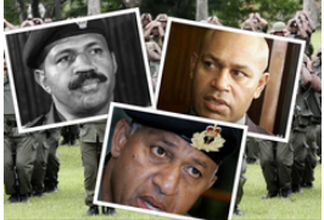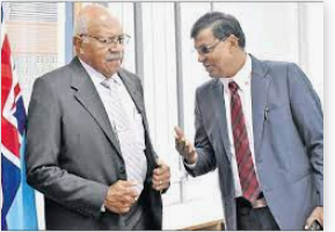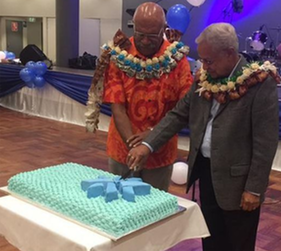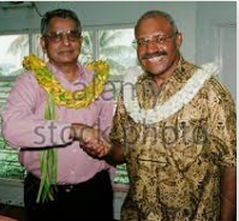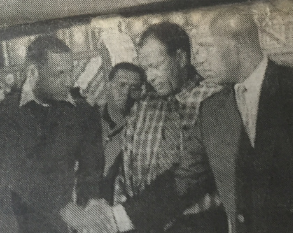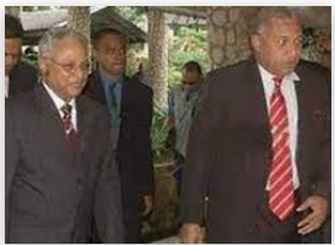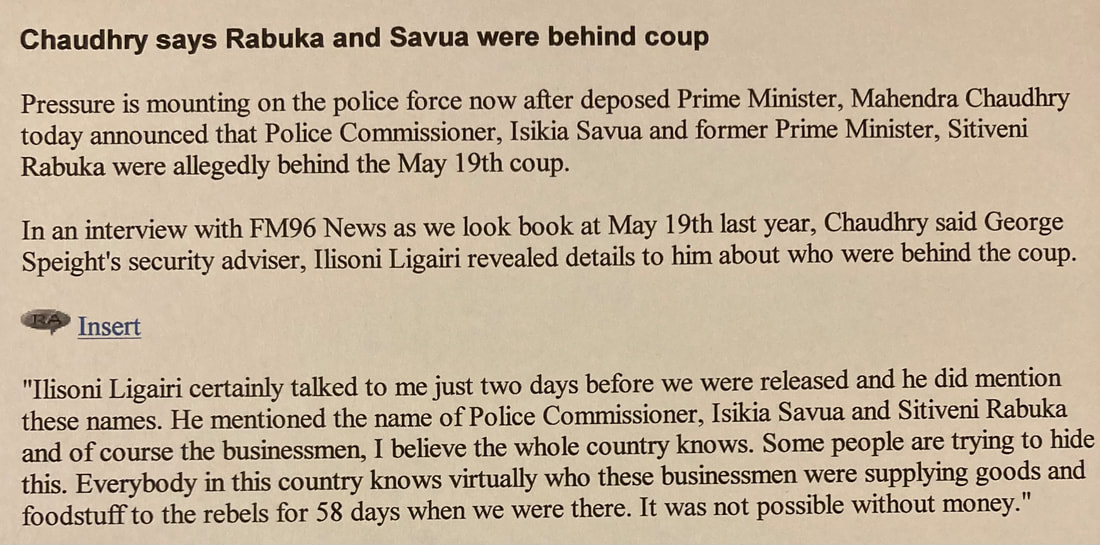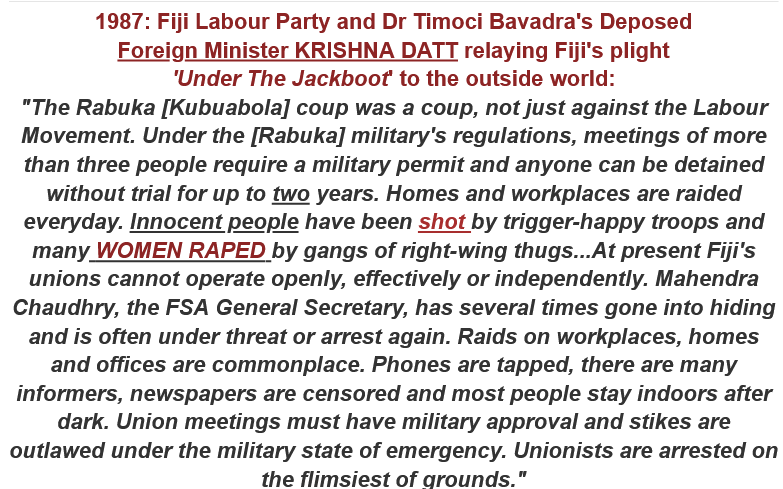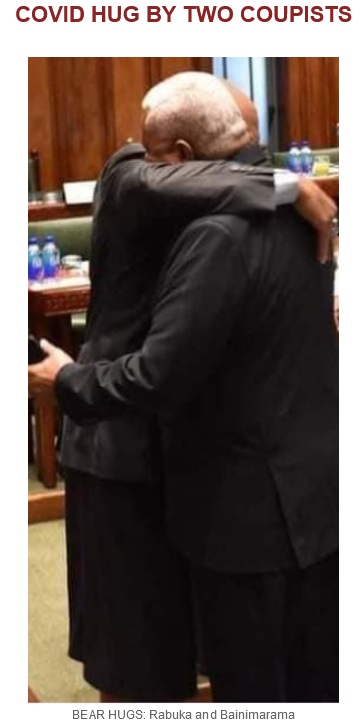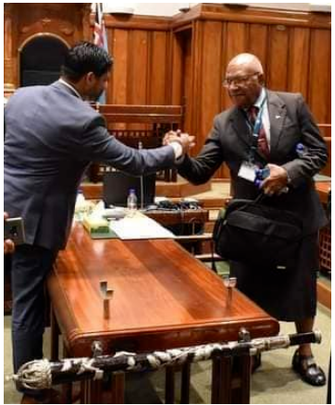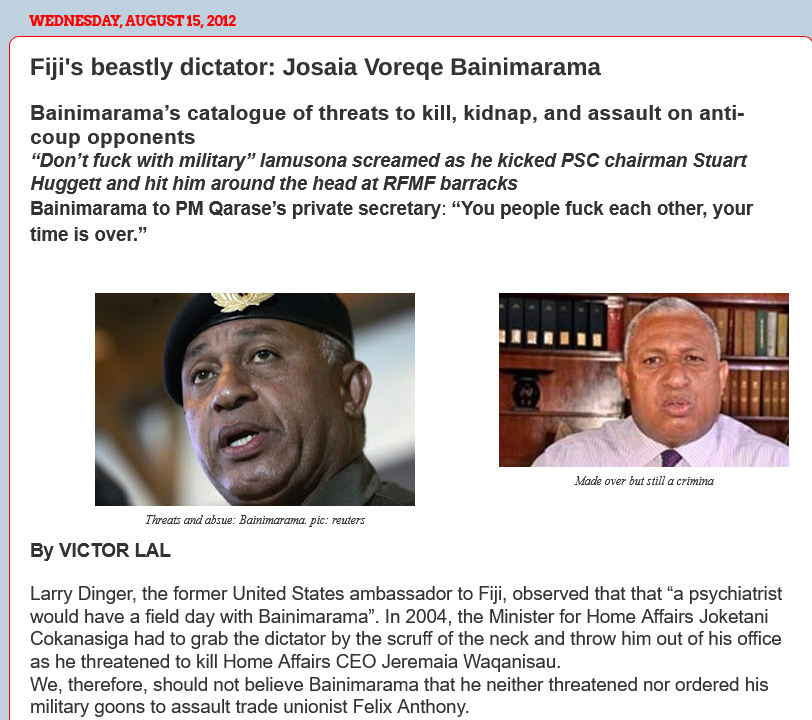CAKING RABUKA rather then getting Him CONVICTED for his
role in 2000 Coup and the overthrow of the Chaudhry government
http://www.coupfourandahalf.com/2012/08/fijis-beastly-dictator-josaia-voreqe.html
Fiji Times - Saturday 25 September 2021
A FEW columns ago, I commented on how Parliament’s new method of “votes by acclamation” had left my head spinning. As Parliament ended this week my head is no better.
Suddenly, on a vote rammed through “by acclamation”, thousands of us now risk of being put through a tiresome and complicated process, just so that we can exercise our democratic right to vote next year.
But it doesn’t end there. Now all your forms of identification – your next passport, your next FNPF card, your next driver’s licence – all of them – may need to be changed so they bear your name on your birth certificate.
Why, when we are going through the worst health and economic crisis we have ever faced as a nation, is all of this important? Because, it seems, for our Attorney- General, the most important thing in the world is not crushing COVID or getting people their jobs back or ensuring families have food or kids get back to school. It’s perfect paperwork.
We all know the back story to this, which is basically that the Attorney-General seems to be annoyed that the Government’s lawyers didn’t win a court case for the Supervisor of Elections. He grumbled that he would now have to change the law.
He ended up changing not one law but three of them. Not just the Electoral Act.
Also the Births Deaths and Marriages Registration Act. Also the Interpretation Act.
Because, just as it turns out in Fawlty Towers - when you try to solve a small problem and don’t stop to think about it - the problem starts growing and creates more problems you have to solve.
As usual, the Bills turned up on Monday.
Nobody had time to read them, understand them or ask anybody about whether they would work. Then on Wednesday, one hour’s debate and – all done. It’s the law.
And, almost certainly, problems for thousands of people are about to begin.
I did an unscientific “straw poll” yesterday among 20 of my workmates. Eight of those 20 have voter cards that do not match their birth certificates.
Some are women who have taken up their husbands’ names. One workmate has a middle name with one letter different.
One has a voter ID card that is just spelled wrong. One has names in different order on each document.
One has so many names on her birth certificate they wouldn’t fit on her voter card.
Imagine – these are people who live in Suva, who have easy access to Government offices and understand paperwork. But what about everybody else? And, contrary to what the Attorney- General thinks, not everyone loves to fill out forms and do paperwork. Not everyone thinks the most important thing in the world is getting their voter cards right.
So these are people who, because it will just get too hard, too expensive or too troublesome, will, through no fault of their own, lose the right to vote at the next election.
Who works for who? Nobody seems to quite know how this is all going to work yet because, no doubt, all the detail will be in “Regulations”. No one has seen these Regulations yet.
Is the Supervisor of Elections going to make all 630,000 registered voters apply for new voter cards now? Or will we have to wait for him to accuse us, like Opposition MP Niko Nawaikula (who started all this) of being bad people for having IDs that don’t match? And now we’ve started, why stop at the voter card? There are all those other mismatched IDs that we should fix.
It all seems so simple when you are sitting in your air-conditioned Ministerial office, surrounded by your bodyguards and your bureaucrats, dreaming of registration perfection.
But in real life there are thousands of different human and cultural stories and different customary situations. Laws and regulations can’t deal with all of them.
And that is exactly why, in government, you don’t make laws you don’t have to make. Because they create unnecessary problems for the people you are supposed to be helping.
Now, literally thousands of people will be forced to line up, do paperwork, get passport-sized photographs, travel to Government offices from their villages and settlements – all so that the Government can say “our records are perfect”.
We all thought the idea was that the Government worked for us. That was why the previous electoral laws allowed for these differences. They accepted that people are different and they have different stories.
And as long as we have a system that will work efficiently – it is OK for people to be different, to have different names. If some bureaucrat messed up their paperwork last time, the system will find a way to make things work for those people.
Because that’s what Governments are supposed to do. They are supposed to work for the people, not the other way around.
And there is no problem with our existing system. After all, wouldn’t our Attorney- General (and Minister for Elections) be the first to say that our 2014 and 2018 elections were well-run? But no. To keep our Attorney-General happy, thousands of us – probably tens or even hundreds of thousands of us - are going to waste time and money working for him.
Two votes for you? I’ve been puzzled about how difficult it has been to explain to people the craziness of the Speaker’s new “acclamation” voting rules in Parliament (the Speaker now says the rules aren’t his, they were made by Parliament’s Business Committee.
That committee doesn’t have the power to change the rules either).
The confused people include former Parliamentary officials and even former MPs.
I have now worked it out. Their main problem seems to be that they assume that political life in Suva is normal and that common sense prevails.
“What’s the problem with this voting system?” they seem to be saying.
“It’s normal for the Speaker to call for ayes and noes. Then if you’re not happy with that you ask for a roll call”.
So everybody - again. The problem with the “new” system is that no roll call is allowed – ever. It’s just “aye” and “no” - then nothing. We don’t know – and will never know - how many MPs voted for what.
So, think about all the time, trouble, effort, drama we’ve been through – even the Solicitor-General has been cast out – to make sure we will only vote once.
And after all that, it turns out that there is a place you can vote twice - and nobody will ever know.
That place is the temple of our democracy – Parliament.
National Federation Party Youth president and budding lawyer Apenisa Vatuniveivuke pointed this out to me the other day.
Every MP can shout “aye” when the Speaker calls for “ayes”.
Then the same MPs can shout “no” when the Speaker calls for “noes”. And nobody will ever know or care - because nobody is counting!
The Attorney-General should urgently turn his attention to this problem. There must be a way to prevent this.
He should insist that each Parliamentarian identify himself or herself properly when they cast their vote (maybe they could wave their birth certificates around while they vote?).
That way he will know that they have only voted once.
Wait a minute. That would be like a roll call.
And isn’t that the system that is already in Parliament’s rules –the very system Parliament won’t follow?
• RICHARD NAIDU is a Suva lawyer. In general elections, he is careful to vote only once. The views expressed in this article are not necessarily the views of The Fiji Times.
A FEW columns ago, I commented on how Parliament’s new method of “votes by acclamation” had left my head spinning. As Parliament ended this week my head is no better.
Suddenly, on a vote rammed through “by acclamation”, thousands of us now risk of being put through a tiresome and complicated process, just so that we can exercise our democratic right to vote next year.
But it doesn’t end there. Now all your forms of identification – your next passport, your next FNPF card, your next driver’s licence – all of them – may need to be changed so they bear your name on your birth certificate.
Why, when we are going through the worst health and economic crisis we have ever faced as a nation, is all of this important? Because, it seems, for our Attorney- General, the most important thing in the world is not crushing COVID or getting people their jobs back or ensuring families have food or kids get back to school. It’s perfect paperwork.
We all know the back story to this, which is basically that the Attorney-General seems to be annoyed that the Government’s lawyers didn’t win a court case for the Supervisor of Elections. He grumbled that he would now have to change the law.
He ended up changing not one law but three of them. Not just the Electoral Act.
Also the Births Deaths and Marriages Registration Act. Also the Interpretation Act.
Because, just as it turns out in Fawlty Towers - when you try to solve a small problem and don’t stop to think about it - the problem starts growing and creates more problems you have to solve.
As usual, the Bills turned up on Monday.
Nobody had time to read them, understand them or ask anybody about whether they would work. Then on Wednesday, one hour’s debate and – all done. It’s the law.
And, almost certainly, problems for thousands of people are about to begin.
I did an unscientific “straw poll” yesterday among 20 of my workmates. Eight of those 20 have voter cards that do not match their birth certificates.
Some are women who have taken up their husbands’ names. One workmate has a middle name with one letter different.
One has a voter ID card that is just spelled wrong. One has names in different order on each document.
One has so many names on her birth certificate they wouldn’t fit on her voter card.
Imagine – these are people who live in Suva, who have easy access to Government offices and understand paperwork. But what about everybody else? And, contrary to what the Attorney- General thinks, not everyone loves to fill out forms and do paperwork. Not everyone thinks the most important thing in the world is getting their voter cards right.
So these are people who, because it will just get too hard, too expensive or too troublesome, will, through no fault of their own, lose the right to vote at the next election.
Who works for who? Nobody seems to quite know how this is all going to work yet because, no doubt, all the detail will be in “Regulations”. No one has seen these Regulations yet.
Is the Supervisor of Elections going to make all 630,000 registered voters apply for new voter cards now? Or will we have to wait for him to accuse us, like Opposition MP Niko Nawaikula (who started all this) of being bad people for having IDs that don’t match? And now we’ve started, why stop at the voter card? There are all those other mismatched IDs that we should fix.
It all seems so simple when you are sitting in your air-conditioned Ministerial office, surrounded by your bodyguards and your bureaucrats, dreaming of registration perfection.
But in real life there are thousands of different human and cultural stories and different customary situations. Laws and regulations can’t deal with all of them.
And that is exactly why, in government, you don’t make laws you don’t have to make. Because they create unnecessary problems for the people you are supposed to be helping.
Now, literally thousands of people will be forced to line up, do paperwork, get passport-sized photographs, travel to Government offices from their villages and settlements – all so that the Government can say “our records are perfect”.
We all thought the idea was that the Government worked for us. That was why the previous electoral laws allowed for these differences. They accepted that people are different and they have different stories.
And as long as we have a system that will work efficiently – it is OK for people to be different, to have different names. If some bureaucrat messed up their paperwork last time, the system will find a way to make things work for those people.
Because that’s what Governments are supposed to do. They are supposed to work for the people, not the other way around.
And there is no problem with our existing system. After all, wouldn’t our Attorney- General (and Minister for Elections) be the first to say that our 2014 and 2018 elections were well-run? But no. To keep our Attorney-General happy, thousands of us – probably tens or even hundreds of thousands of us - are going to waste time and money working for him.
Two votes for you? I’ve been puzzled about how difficult it has been to explain to people the craziness of the Speaker’s new “acclamation” voting rules in Parliament (the Speaker now says the rules aren’t his, they were made by Parliament’s Business Committee.
That committee doesn’t have the power to change the rules either).
The confused people include former Parliamentary officials and even former MPs.
I have now worked it out. Their main problem seems to be that they assume that political life in Suva is normal and that common sense prevails.
“What’s the problem with this voting system?” they seem to be saying.
“It’s normal for the Speaker to call for ayes and noes. Then if you’re not happy with that you ask for a roll call”.
So everybody - again. The problem with the “new” system is that no roll call is allowed – ever. It’s just “aye” and “no” - then nothing. We don’t know – and will never know - how many MPs voted for what.
So, think about all the time, trouble, effort, drama we’ve been through – even the Solicitor-General has been cast out – to make sure we will only vote once.
And after all that, it turns out that there is a place you can vote twice - and nobody will ever know.
That place is the temple of our democracy – Parliament.
National Federation Party Youth president and budding lawyer Apenisa Vatuniveivuke pointed this out to me the other day.
Every MP can shout “aye” when the Speaker calls for “ayes”.
Then the same MPs can shout “no” when the Speaker calls for “noes”. And nobody will ever know or care - because nobody is counting!
The Attorney-General should urgently turn his attention to this problem. There must be a way to prevent this.
He should insist that each Parliamentarian identify himself or herself properly when they cast their vote (maybe they could wave their birth certificates around while they vote?).
That way he will know that they have only voted once.
Wait a minute. That would be like a roll call.
And isn’t that the system that is already in Parliament’s rules –the very system Parliament won’t follow?
• RICHARD NAIDU is a Suva lawyer. In general elections, he is careful to vote only once. The views expressed in this article are not necessarily the views of The Fiji Times.

